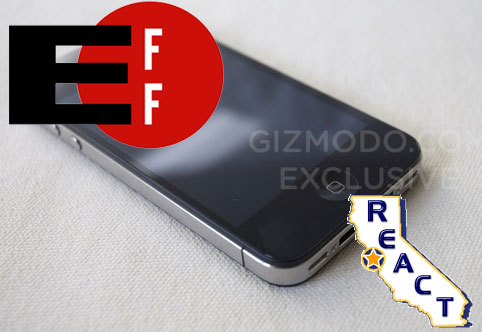EFF Lawyer: Seizure of Gizmodo Editor's Computers Violates State and Federal Law

The Net is buzzing about San Mateo, California law enforcement officials' search and seizure of Gizmodo Editor Jason Chen's computers. Acting under a search warrant issued by California's Superior Court, agents of the Rapid Enforcement Allied Computer Team (REACT), broke down Chen's door this past Friday and searched his home, confiscating 24 items, including four computers, two severs, and several external hard drives. The authorities were searching for evidence regarding how Chen and Gizmodo came to purchase an iPhone prototype.
From the moment Gizmodo posted about the search and seizure this afternoon, journalists around the country started to weigh in. David Pogue tweeted "J. Chen reports on lost iPhone for Gizmodo--police break into his house, take PCs + drives. Is Apple behind this!?" ZDNet's Zach Honig wrote "Am I missing something? The @Gizmodo issue is the purchase of stolen property, right? (felony) Where does the First Amendment play in there?" Our own Dana Wollman wondered "is Jason Chen (@diskopo) the Fall Guy?" Technologizer's Harry McCracken took a measured position, writing in his blog that " I’m in favor of everybody involved complying with the law–journalists and police–but I’m also very sorry to read about the seizure, and hopeful that things work out okay for him."
The Electronic Frontier Foundation, the Internet's leading digital rights advocacy group, has also taken a public position on the search, telling us that California's search warrant is illegal and should never have been issued. In a phone interview this afternoon, EFF Civil Liberties Director Jennifer Granick told us: "There are both federal and state laws here in California that protect reporters and journalists from search and seizure for their news gathering activities. The federal law is the Privacy Protection Act and the state law is a provision of the penal code and evidence code. It appears that both of those laws may be being violated by this search and seizure."
Granick said that, even if Jason Chen is under investigation for receipt of stolen property, the government has no right to issue a search warrant, because California law includes exceptions for journalists who are in receipt of information from sources.
"There’s a prohibition that says the government may not seize work product or documentary materials that are possessed in connection with news reporting and then it says that protection does not apply if there’s probable cause to believe the reporter is committing a crime, but then it says that exception to the exception doesn’t apply if the crime that the reporter is being investigated for is receipt of the information," she said. "Whether or not receiving the iPhone was a criminal matter, the Privacy Protection Act says that you can’t do a search for receipt of that information. I think the idea that looking at the iPhone was unlawful is a real stretch. We don’t know what the claim is for that. I don't know that that's what they're claiming. We don't know what the situation is. But even if they are saying it was unlawful, the statute appears to say it doesn’t matter. The crime that you’re investigating cannot be receipt of that information or materials."
Granick said that a gadget like an iPhone fits the definition of "information or materials" and falls under the law's protection.
The Privacy Protection Act states that "a government officer or employee may not search for or seize such materials under the provisions of this paragraph if the offense to which the materials relate consists of the receipt, possession, communication, or withholding of such materials or the information contained therein."
Stay in the know with Laptop Mag
Get our in-depth reviews, helpful tips, great deals, and the biggest news stories delivered to your inbox.
The state law Granick referred to is California Penal Code section 1524G which states "No warrant shall issue for any item or items described in Section 1070 of the Evidence Code." And section 1070 of the evidence code states that:
A publisher, editor, reporter, or other person connected with or employed upon a newspaper, magazine, or other periodical publication, or by a press association or wire service, or any person who has been so connected or employed, cannot be adjudged in contempt by a judicial, legislative, administrative body, or any other body having the power to issue subpoenas, for refusing to disclose, in any proceeding as defined in Section 901, the source of any information procured while so connected or employed for publication in a newspaper, magazine or other periodical publication, or for refusing to disclose any unpublished information obtained or prepared in gathering, receiving or processing of information for communication to the public.
Granick also said that, rather than issuing a search warrant, the court should have issued a subpoena. "The subpoena gives the reporter an opportunity to ask the court to review the request and it also gives the reporter an opportunity to segregate potentially responsive information from private information," she said. "The search warrant process doesn't allow for either of those." Under a subpoena, Chen would be able to not only challenge the government's request, but also make sure that authorities do not get to look at other information on his hard drive such as his banking records or e-mails about other stories.
As of this writing, Chen's materials remain in the possession of California's REACT team and EFF, though it has a strong opinion, is waiting to see what happens. "We're following the case really closely," Granick said when asked about the possibility of EFF taking legal action. "We do a lot of computer search and computer privacy work so this implicates a lot of stuff we're really interested in, but at this point Gizmodo has lawyers and we'll be paying attention, but there's nothing to do right now."
Update: EFF has now published its own blog post, with additional details on the law behind the case.

